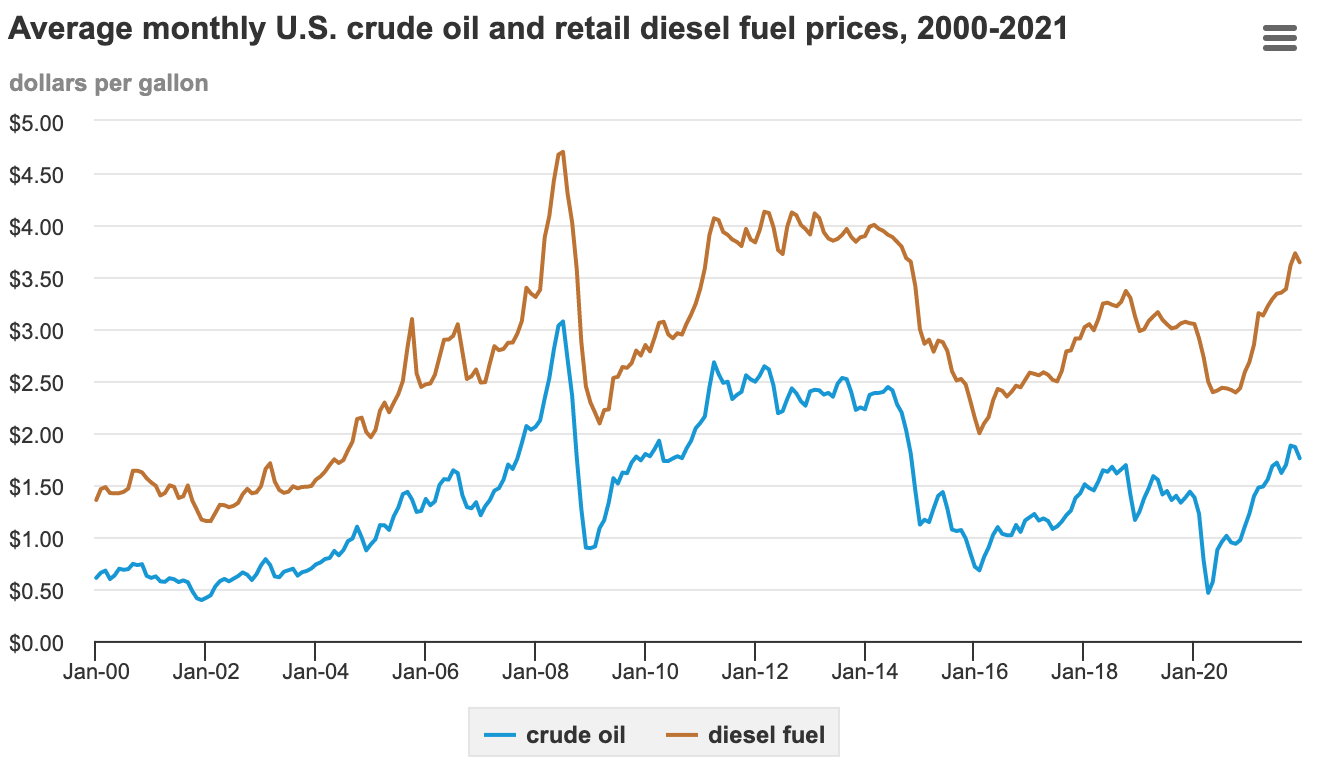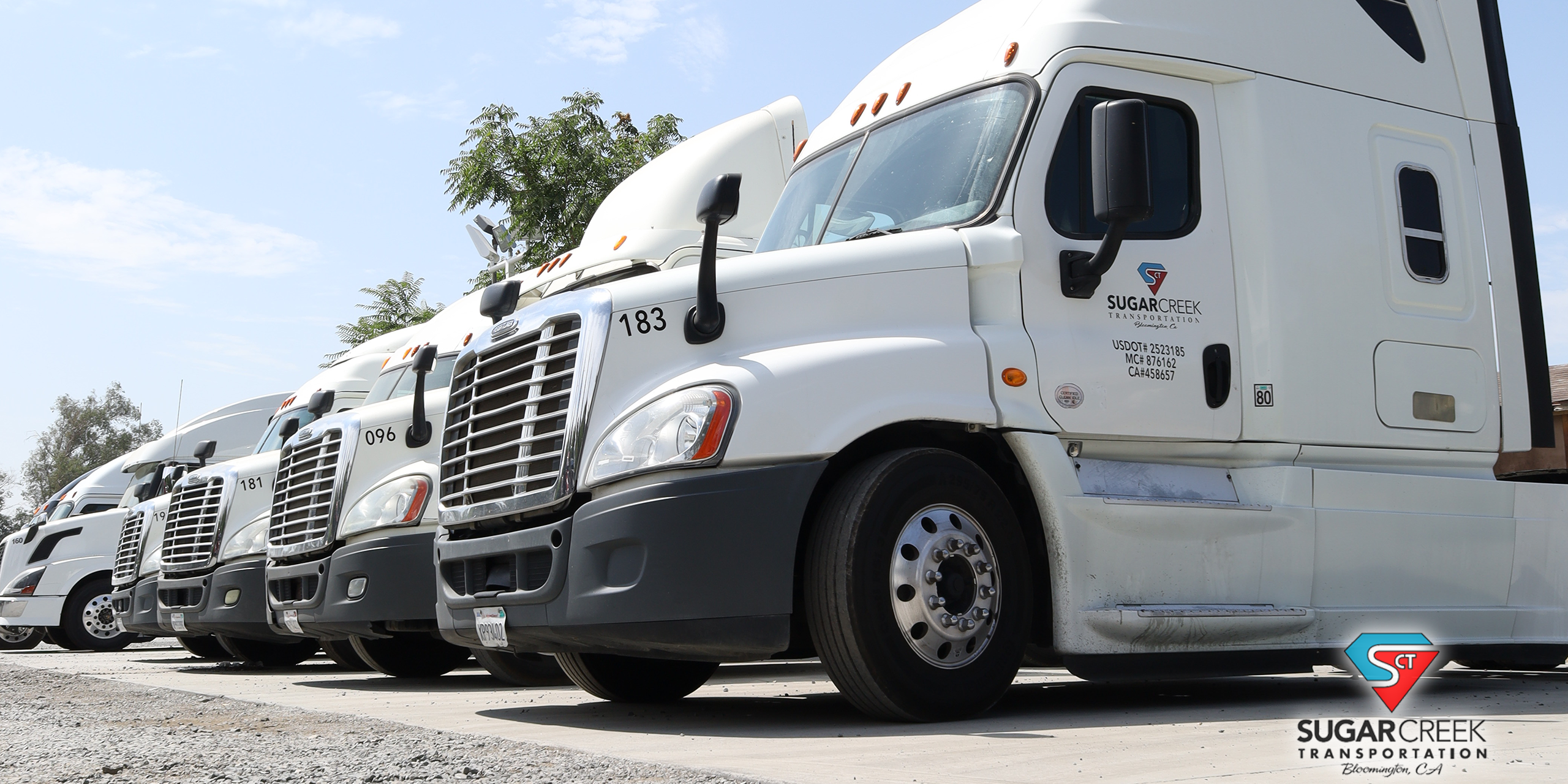Average regular-grade gasoline prices have risen by a whopping 79 cents in the last two weeks, to an all-time high of $4.43 per gallon in the United States. In some parts of the country, it’s even higher than that. Fuel prices have risen by $1.18 per gallon over the course of two weeks alone. Many in the trucking business use diesel engines for transport due to performance and efficiency. In comparison to a year ago, diesel is now $2.11 more expensive. It has become extremely expensive and questionable as to how cargo and freight can be moved. Even with diesel engines, due to high diesel gas prices, it has become extremely challenging for trucking companies like Sugar Creek Transportation and others to keep on trucking.
“I wanted to talk to you about the rising prices of diesel fuel.”, said Monica Byers, President of Sugar Creek Transportation.
How Are Diesel Prices Determined?
A lot of people do not completely understand how diesel prices are configured. What factors play into the determination of cost? What affects the increase and decrease of cost? Let’s break this down further.
A gallon of diesel fuel’s retail price reflects the costs and profits (or losses) of manufacturing and distributing the product to customers. The retail price of a gallon of diesel fuel is determined by four major factors:
- The price of crude oil bought by refineries.
- Costs and earnings are being refined.
- Costs and earnings for distribution, marketing, and retail stations
- Taxation (federal, state, county, and local government).
The proportion of these components in the retail price of a gallon of diesel fuel fluctuates over time and depends on the location of the United States where it is marketed.

Source: EIA.gov
From 2000 through 2021, the cost of crude oil contributed to over half of the monthly average U.S. retail on-highway diesel fuel prices. Crude oil prices are determined by global crude oil demand and supply. Demand for petroleum products derived from crude oil is influenced by global economic conditions. What influences crude oil prices? It’s important to understand the key variables influencing crude oil pricing. Diesel fuel is a key transportation fuel. Its demand tends to follow economic trends.
The price of diesel fuel in the United States is affected by the demand for distillate fuel in other parts of the world. The demand for heating oil and diesel fuel is almost the same, so changes in the demand for one fuel may affect prices for the other fuel as well. Many countries have more diesel cars and use more distillate fuel to make electricity than the United States does.
What Consumers Must Know About Rising Diesel Fuel Prices
Looking for that milk, toilet paper, detergent, meat? The cost of these and others will soon go up. All of these essentials and more all come from the back of a truck. They are delivered by truck drivers across the country. Without the truck drivers that deliver the goods for some of the biggest corporations like Amazon, Target, Costco, UPS (which just so happen to be all Sugar Creek Transportation customers), the products and goods you purchase daily will never reach store shelves.
What do rising diesel prices have to do with you as the consumer though? How does that affect you getting hands-on those essentials you need?
“The price of diesel fuel right now is $6.15 cents per gallon.”, says Monica Byers, President of Sugar Creek Transportation. Here at Sugar Creek Transportation, most of our trucks require a 300-gallon fill-up. That’s 150 gallons per side, per tank, for a total of two tanks. When filled full it amounts to $1,845.
Most of our local truck drivers in the State of California get paid currently based upon the National Average. So, if you’ve been following along thus far, most truck drivers are actually driving as an expense because they are not being reimbursed for the fuel cost. The U.S. government does give an allotment to supplement the cost of fuel on weekly basis. However, due to the drastic increase in diesel fuel, it’s simply not catching up. Truckers in California currently pay $1 per gallon more than the national average.
If truck drivers and truck companies are not profitable then they soon will be unwilling to deliver. As it stands, Sugar Creek Transportation trucks are delivering products and goods at a deficit.
How are Truckers Affected
It’s important to understand how truckers are paid. How that ultimately affects delivery of goods to shelves and the cost of those goods you as a consumer pay at the register. Here’s an example of how a truck driver gets paid so you can better understand the financial implications and the rise in the cost of goods sold at retail stores.
Truckers are paid a flat fee and a surcharge for runs. For example, if you are getting paid a $1,000 to deliver from South California to Phoenix. That’s 330 miles each way for a round-trip of 660 miles. Give or take. At the time of your trip gas was approximately $4 per gallon before the massive jump in the last two weeks. That’s $440. Now you are having to pay $676 which is a deficit of $236 per day.
The $236 deficit has to get squeezed on the truckers and also on Sugar Creek Transportation. A deficit does not offer any kind of profit. In order for us as a trucking company to continue to operate, we must push back that deficit onto the consumer. You! As result, the cost of goods like milk, toilet paper, detergent, meat, etc. will go up in the hope to close the gap of the deficit.
What Can You Do As a Consumer?
You can write to your local and state representative to raise awareness around the rising costs of fuel. It will most definitely help generate the necessary attention. As a consumer and a bottom-line user of these products and goods, it’s important to understand the necessity of price increases. The cost of milk, cereal, meat, toiletries, and other things will simply need to increase. That is to help justify the deficit companies like Sugar Creek Transportation are currently withstanding.
Are you interested in getting into the trucking space? Have any questions? Reach out to us at (909) 746-0370 or by email at: recruiting@scetrans.com. You can also follow us on LinkedIn, Instagram, Facebook, and Twitter.









Very nice post. I just stumbled upon your blog and wanted to say that I’ve really enjoyed browsing your blog posts. In any case I’ll be subscribing to your feed and I hope you write again soon!
Thanks for sharing. I read many of your blog posts, cool, your blog is very good.
Your article made me suddenly realize that I am writing a thesis on gate.io. After reading your article, I have a different way of thinking, thank you. However, I still have some doubts, can you help me? Thanks.
Your article helped me a lot, is there any more related content? Thanks!
I am a student of BAK College. The recent paper competition gave me a lot of headaches, and I checked a lot of information. Finally, after reading your article, it suddenly dawned on me that I can still have such an idea. grateful. But I still have some questions, hope you can help me.
This article opened my eyes, I can feel your mood, your thoughts, it seems very wonderful. I hope to see more articles like this. thanks for sharing.
Reading your article helped me a lot and I agree with you. But I still have some doubts, can you clarify for me? I’ll keep an eye out for your answers.
I am currently writing a paper that is very related to your content. I read your article and I have some questions. I would like to ask you. Can you answer me? I’ll keep an eye out for your reply. 20bet
Your point of view caught my eye and was very interesting. Thanks. I have a question for you.
Thank you for your sharing. I am worried that I lack creative ideas. It is your article that makes me full of hope. Thank you. But, I have a question, can you help me?
Very interesting topic, regards for posting.Raise blog range
Your point of view caught my eye and was very interesting. Thanks. I have a question for you.
I don’t think the title of your article matches the content lol. Just kidding, mainly because I had some doubts after reading the article.
Thanks for sharing. I read many of your blog posts, cool, your blog is very good.
I don’t think the title of your article matches the content lol. Just kidding, mainly because I had some doubts after reading the article.
Thank you for your shening. I am worried that I lack creative ideas. It is your enticle that makes me full of hope. Thank you. But, I have a question, can you help me?
Can you be more specific about the content of your article? After reading it, I still have some doubts. Hope you can help me.
Thanks for sharing. I read many of your blog posts, cool, your blog is very good.
Thanks for sharing. I read many of your blog posts, cool, your blog is very good.
Thanks for sharing. I read many of your blog posts, cool, your blog is very good.
Your point of view caught my eye and was very interesting. Thanks. I have a question for you.
I don’t think the title of your article matches the content lol. Just kidding, mainly because I had some doubts after reading the article.
I don’t think the title of your article matches the content lol. Just kidding, mainly because I had some doubts after reading the article.
Thank you for your sharing. I am worried that I lack creative ideas. It is your article that makes me full of hope. Thank you. But, I have a question, can you help me?
Can you be more specific about the content of your article? After reading it, I still have some doubts. Hope you can help me.
Can you be more specific about the content of your article? After reading it, I still have some doubts. Hope you can help me.
Can you be more specific about the content of your article? After reading it, I still have some doubts. Hope you can help me.
Your article helped me a lot, is there any more related content? Thanks!
Thank you for your sharing. I am worried that I lack creative ideas. It is your article that makes me full of hope. Thank you. But, I have a question, can you help me?